 First edition | |
| Author | Vladimir Nabokov |
|---|---|
| Country | United States |
| Language | English |
| Publisher | McGraw-Hill Companies |
Publication date | 1972 |
Transparent Things is a novel by Vladimir Nabokov published in 1972. It was originally written in English.
 First edition | |
| Author | Vladimir Nabokov |
|---|---|
| Country | United States |
| Language | English |
| Publisher | McGraw-Hill Companies |
Publication date | 1972 |
Transparent Things is a novel by Vladimir Nabokov published in 1972. It was originally written in English.
The short novel tells the story of Hugh Person, an American literary editor and proofreader, and his four trips to and from Switzerland over the course of almost two decades.
Hugh Person first visits Switzerland as a young man with his father, who dies during the trip. A number of years later, Person undertakes a second trip on behalf of his publisher in order to liaise with R., a gifted if leisurely and eccentric author. In the process, he also makes the acquaintance of Armande, whom he later marries and moves to New York with. His third trip is taken in an attempt to persuade R. to make alterations to his latest manuscript, Tralatitions, which the author refuses to do, while Armande, who has come along with Hugh, is too late to see her dying mother one last time. After the two return, Person proofreads and edits R.'s contentious manuscript, and goes to bed with Armande. The police interrupt in order to interview him, and he tells them of having dreamt of the house being on fire as he restrained a series of flickering images of his companion, alternatingly Armande and other women he has known, from leaping out of it. Finally, Hugh visits and wanders through Switzerland alone, stopping by Armande's childhood home and the hotels the two have previously stayed in, having spent the past several years in a string of hospitals after having strangled Armande in a what Person claims to remember only as a state of particularly deep sleep, having since childhood been prone to episodes of sleepwalking aided only by inducing himself into dreams of playing tennis. A fire breaks out in the hotel Person is in and kills him as the author, or authors, of the tale ease him into the new state.
In The New York Times Book Review , writer Mavis Gallant wrote, "Vladimir Nabokov, having spent his life building the Taj Mahal, has decided at the age of 73—for his own amusement and incidentally for our pleasure—to construct a small mock replica. The miniature is not flawed, no, but the most splendid features of the great model have been just slightly parodied, out of playfulness almost." Gallant found the short novel to be "as casual, as unpredictable, as eccentric and as daunting as Mr. Nabokov's genius." [1]
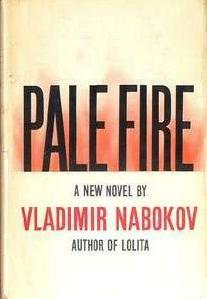
Pale Fire is a 1962 novel by Vladimir Nabokov. The novel is presented as a 999-line poem titled "Pale Fire", written by the fictional poet John Shade, with a foreword, lengthy commentary and index written by Shade's neighbor and academic colleague, Charles Kinbote. Together these elements form a narrative in which both fictional authors are central characters. Nabokov wrote Pale Fire in 1960–61, after the success of Lolita had made him financially independent, allowing him to retire from teaching and return to Europe. It was commenced in Nice and completed in Montreux, Switzerland.
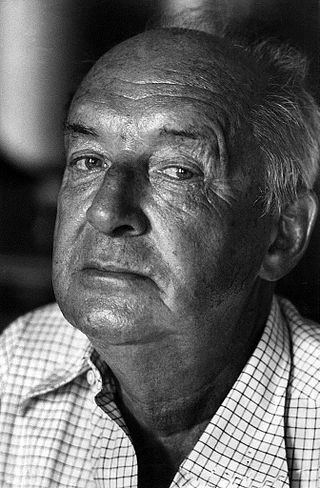
Vladimir Vladimirovich Nabokov, also known by the pen name Vladimir Sirin, was an expatriate Russian and Russian-American novelist, poet, translator, and entomologist. Born in Imperial Russia in 1899, Nabokov wrote his first nine novels in Russian (1926–1938) while living in Berlin, where he met his wife. He achieved international acclaim and prominence after moving to the United States, where he began writing in English. Nabokov became an American citizen in 1945 and lived mostly on the East Coast before returning to Europe in 1961, where he settled in Montreux, Switzerland.

Boris Nikolaevich Bugaev, better known by the pen name Andrei Bely or Biely, was a Russian novelist, Symbolist poet, theorist and literary critic. He was a committed anthroposophist and follower of Rudolf Steiner. His novel Petersburg (1913/1922) was regarded by Vladimir Nabokov as the third-greatest masterpiece of modernist literature. The Andrei Bely Prize, one of the most important prizes in Russian literature, was named after him. His poems were set to music and performed by Russian singer-songwriters.
Ada or Ardor: A Family Chronicle is a novel by Vladimir Nabokov published in 1969.

The Gift is Vladimir Nabokov's final Russian novel, and is considered to be his farewell to the world he was leaving behind. Nabokov wrote it between 1935 and 1937 while living in Berlin, and it was published in serial form under his pen name, Vladimir Sirin.

The Original of Laura is an incomplete novel by Vladimir Nabokov, which he was writing at the time of his death in 1977. It was published by Nabokov's son Dmitri Nabokov in 2009, despite the author's request that the work be destroyed upon his death.
Bend Sinister is a dystopian novel written by Vladimir Nabokov during the years 1945 and 1946, and published by Henry Holt and Company in 1947. It was Nabokov's eleventh novel and his second written in English.

Despair is the seventh novel by Vladimir Nabokov, originally published in Russian, serially in the politicized literary journal Sovremennye zapiski during 1934. It was then published as a book in 1936, and translated to English by the author in 1937. Most copies of the 1937 English edition were destroyed by German bombs during World War II; only a few copies remain. Nabokov published a second English translation in 1965; this is now the only English translation in print.
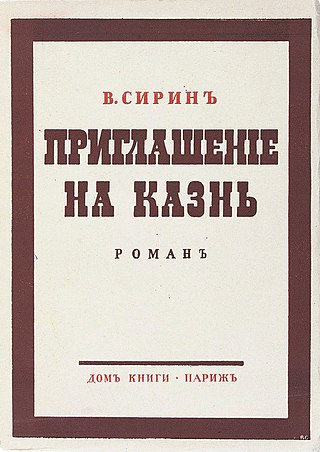
Invitation to a Beheading is a novel by Russian American author Vladimir Nabokov. It was originally published in Russian from 1935 to 1936 as a serial in Sovremennye zapiski, a Russian émigré magazine. In 1938, the work was published in Paris, with an English translation following in 1959. The novel was translated into English by Nabokov's son, Dmitri Nabokov, under the author's supervision.
The Real Life of Sebastian Knight is the first English-language novel by Vladimir Nabokov, written from late 1938 to early 1939 in Paris and first published in 1941. A work centred on language and its inability to convey any satisfactory definition, it has been identified as a forerunner of the postmodernist novel.

The Defense is the third novel written by Vladimir Nabokov after he had immigrated to Berlin. It was first published in Russian 1930 and later in English in 1964.
Dmitri Vladimirovich Nabokov was an American opera singer and translator. Born in Berlin, he was the only child of Russian parents: author Vladimir Nabokov and his wife Vera; they emigrated to the United States from France in 1940. He later was naturalized. In his later years, Nabokov translated many of his father's works into other languages, and served as the executor of his father's literary estate.
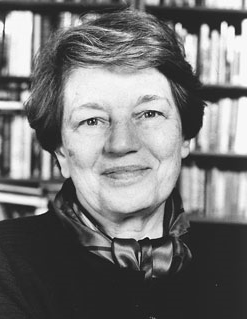
Mavis Leslie de Trafford Gallant,, née Young, was a Canadian writer who spent much of her life and career in France. Best known as a short story writer, she also published novels, plays and essays.
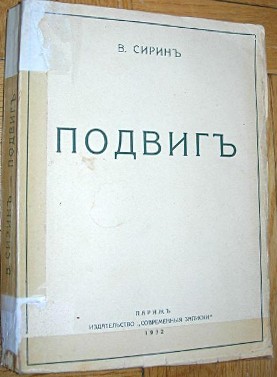
Glory is a Russian novel written by Vladimir Nabokov between 1930 and 1932 and first published in Paris.

Laughter in the Dark is a novel written by Vladimir Nabokov and serialised in Sovremennye zapiski in 1932.

King, Queen, Knave was the second novel written by Vladimir Nabokov while living in Berlin and sojourning at resorts in the Baltic. Written in the years 1927–8, it was published as Король, дама, валет in Russian in October 1928 and then translated into German by Siegfried von Vegesack as König, Dame, Bube: ein Spiel mit dem Schicksal. Forty years later the novel was translated into English by Nabokov's son Dmitri, with significant changes made by the author. A film adaptation only loosely based on the novel followed in 1972.

The Enchanter is a novella written by Vladimir Nabokov in Paris in 1939. As Волшебник (Volshebnik) it was his last work of fiction written in Russian. Nabokov never published it during his lifetime. After his death, his son Dmitri translated the novella into English in 1986 and it was published the following year. Its original Russian version became available in 1991. The story deals with the hebephilia of the protagonist and thus is linked to and presages the Lolita theme.
"Bachmann" is a short story written in Russian by Vladimir Nabokov under his pen name, Vladimir Sirin, in Berlin in 1924. The story details a three-year love affair between the titular Bachmann, a celebrated pianist, and Mme. Perov, a married woman.

Lolita is a 1955 novel written by Russian-American novelist Vladimir Nabokov which addresses hebephilia. The protagonist is an unreliable narrator, a French literature professor who moves to New England and writes under the pseudonym Humbert Humbert. He describes his obsession with a 12-year-old "nymphet", Dolores Haze, whom he kidnaps and sexually abuses after becoming her stepfather. Privately, he calls her "Lolita", the Spanish nickname for Dolores. The novel was originally written in English, but fear of censorship in the U.S. and Britain led to it being first published in Paris, France, in 1955 by Olympia Press.
Jacques Chambrun was an American literary agent active in the 1940s and 1950s. He worked with a wide swath of clients, including novelists Mavis Gallant, Zora Neale Hurston, Aldous Huxley, W. Somerset Maugham, Grace Metalious, H. G. Wells, and Virginia Woolf, along with screenwriter Ben Hecht and historian Shelby Foote. However, he soon gained notoriety for his business practices, including embezzling money from writers.